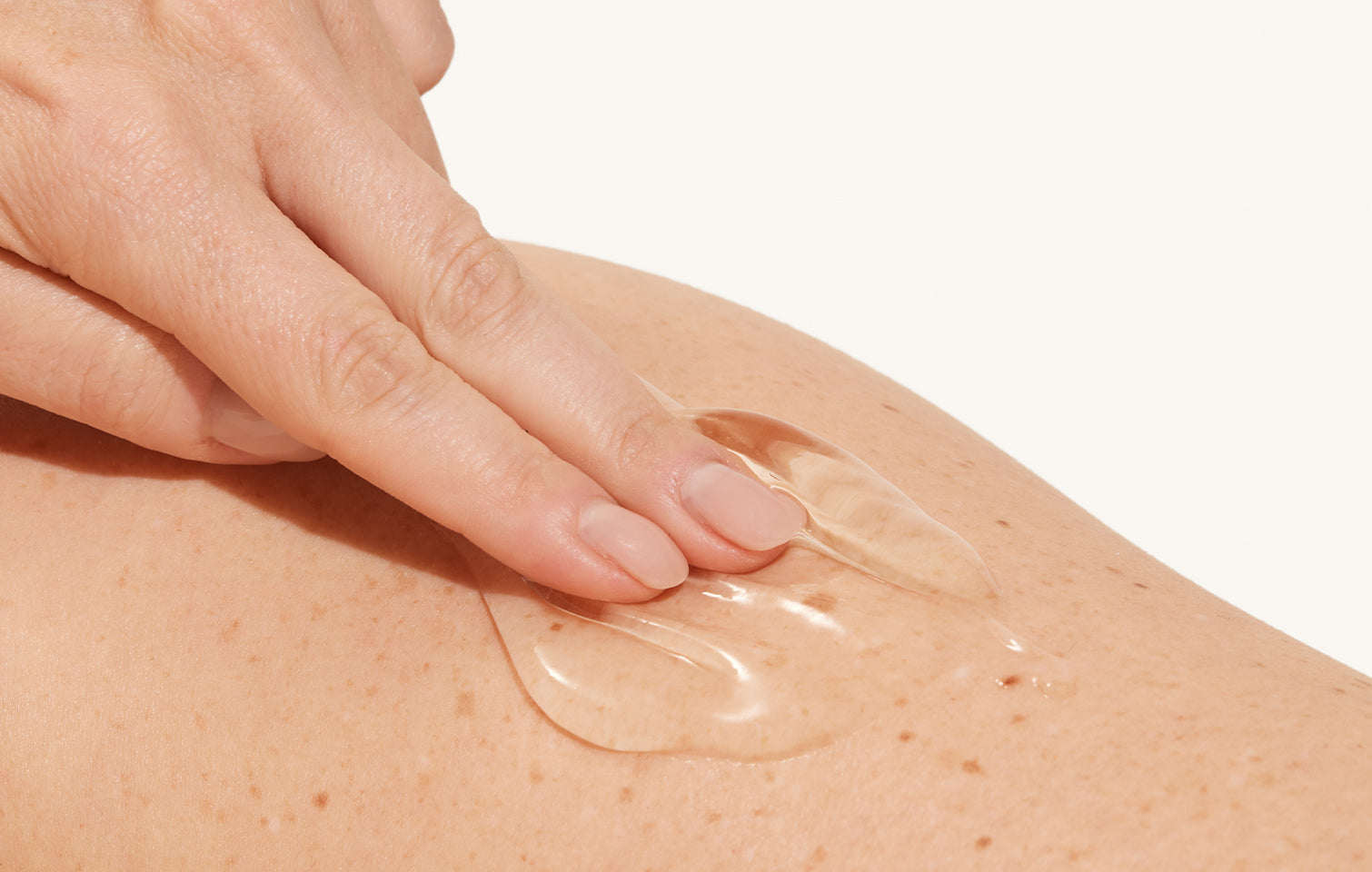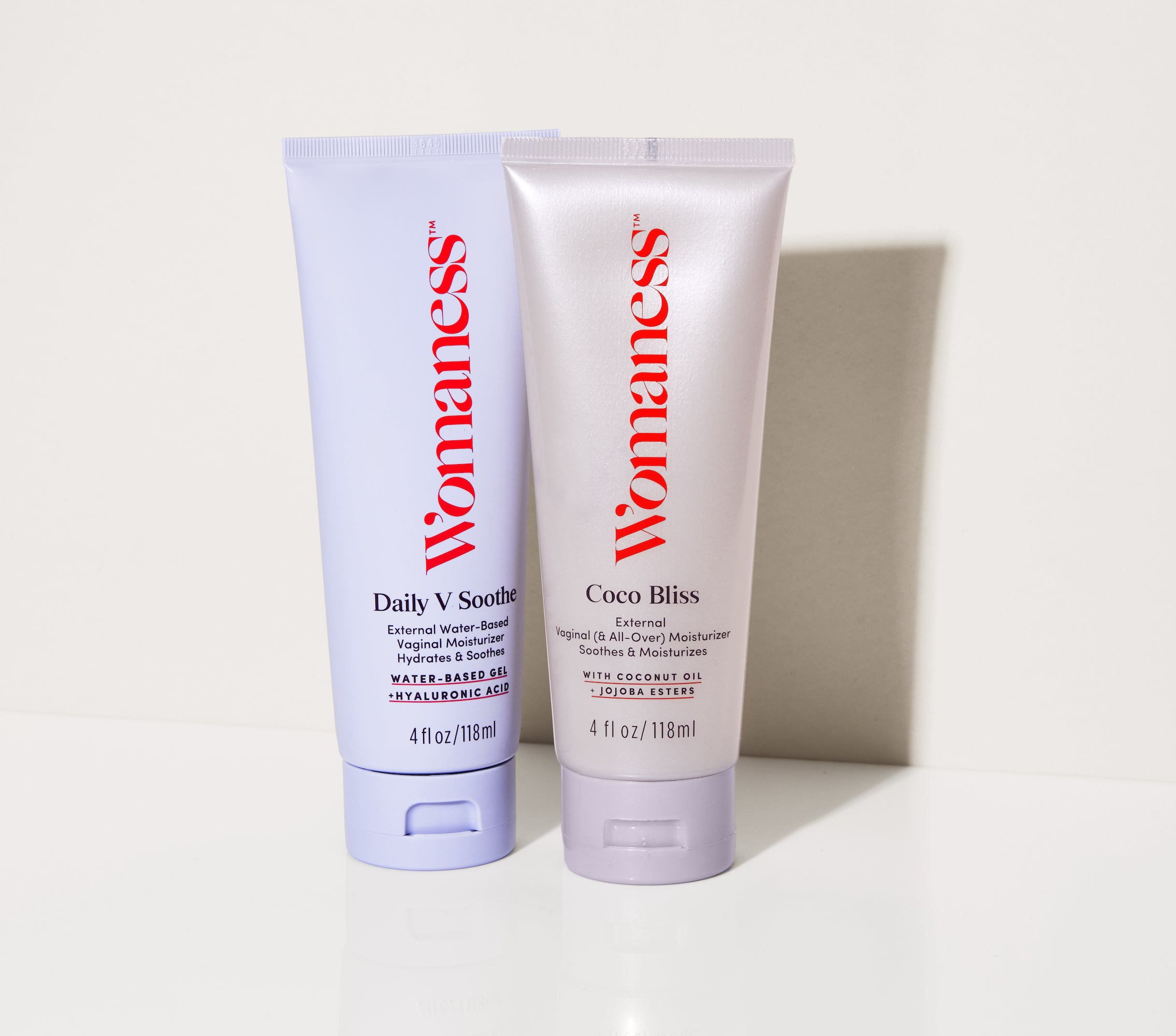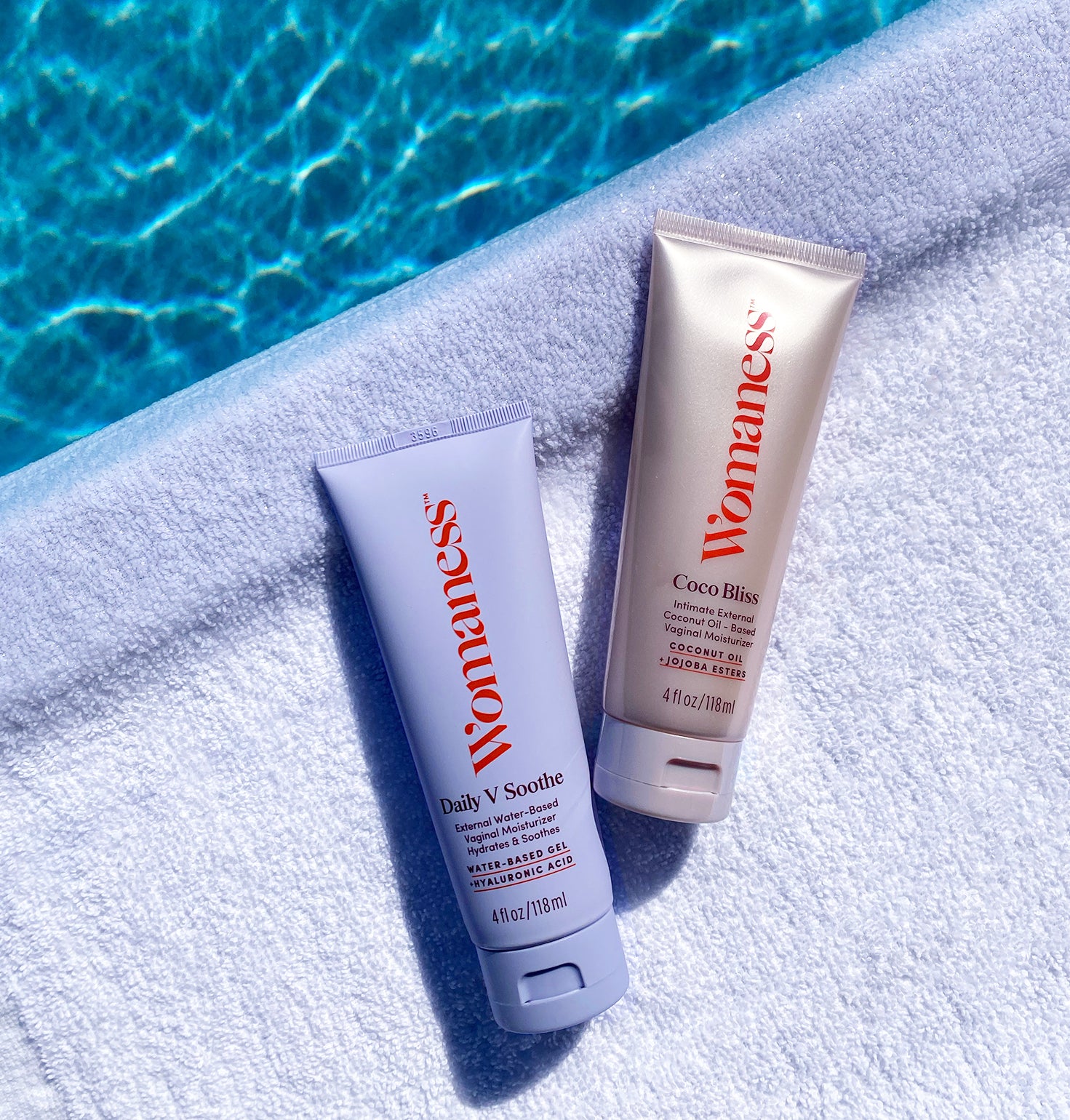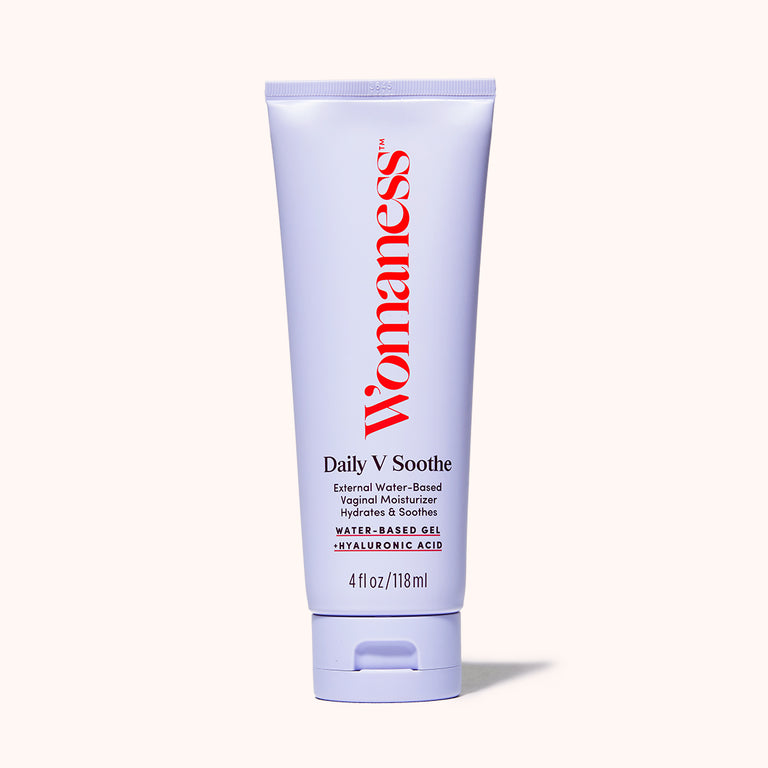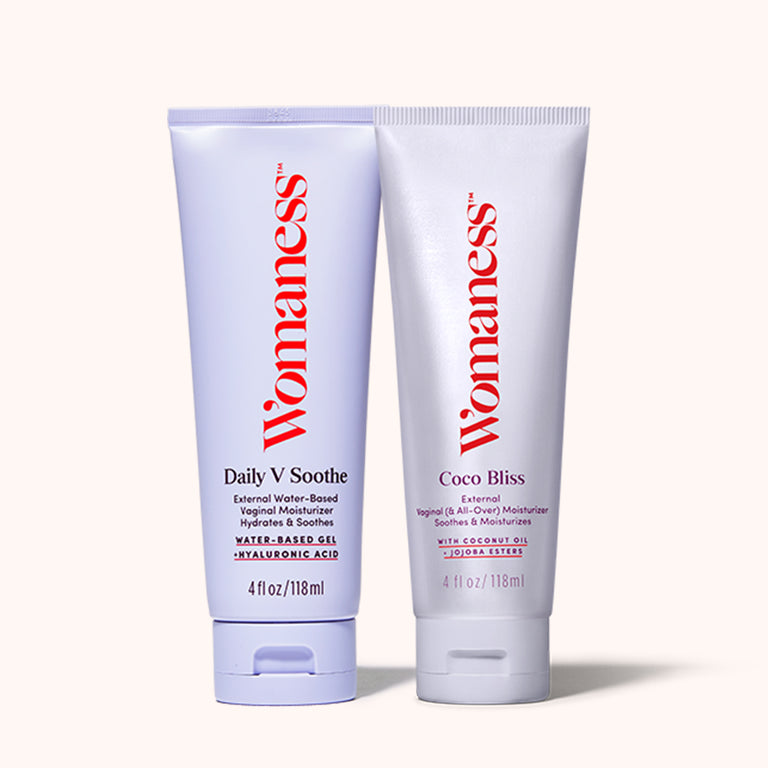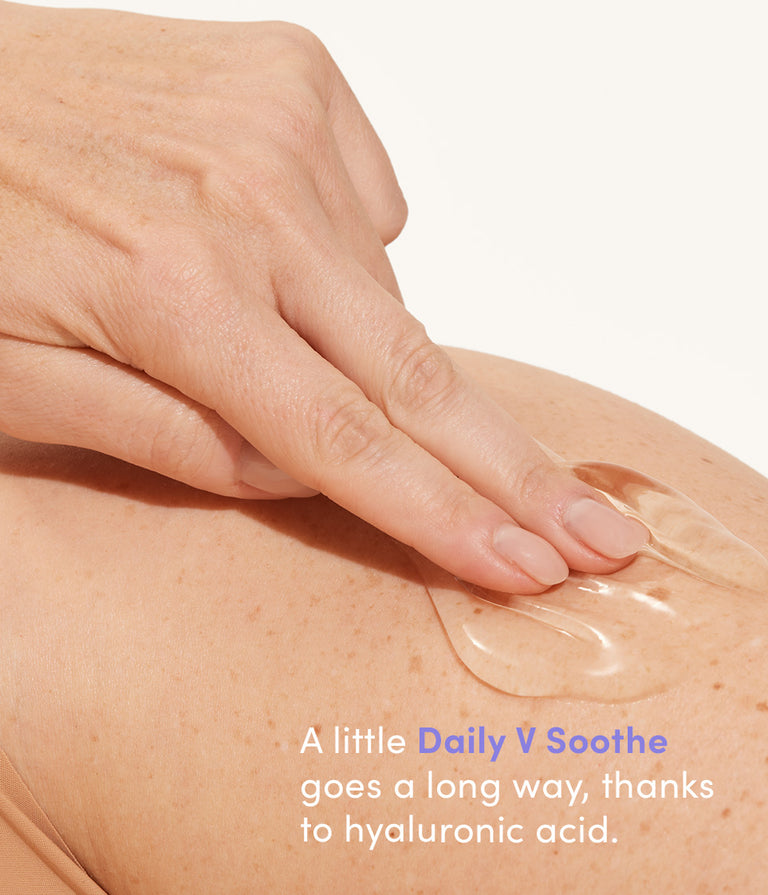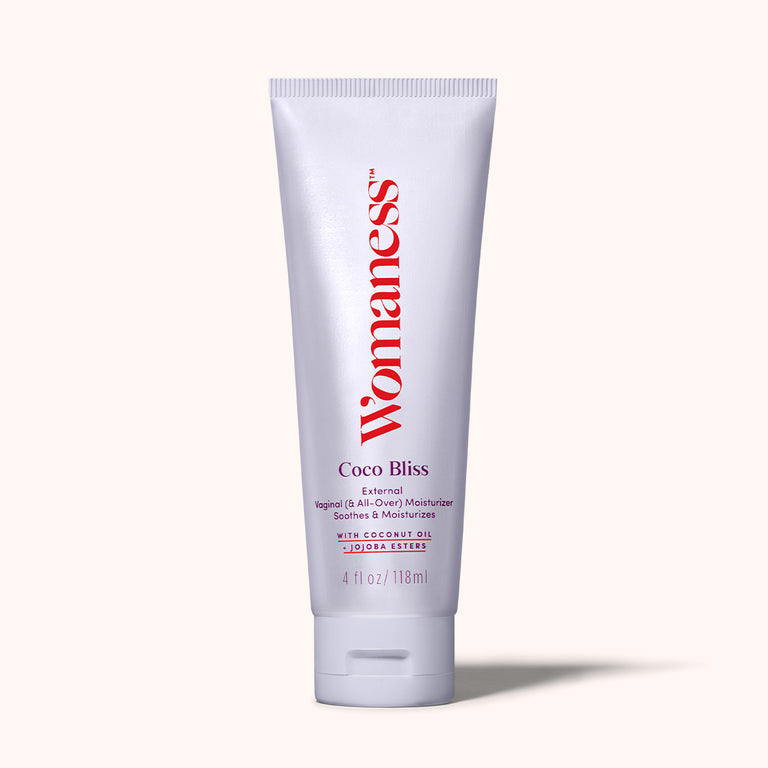By Womaness Editors 4-Minute Read
What Products Can You Use for Vaginal Dryness?
Vaginal dryness is a very common issue among many of us, affecting nearly 50% of women as they age. (So if you're going through it, you are not alone!)
The Mayo Clinic suggests that menopause is, of course, a significant cause of vaginal dryness. This is because estrogen loss can result in changes to surface (mucosal) cells, leading to a reduced number of cells, decreased lubrication, and less vaginal elasticity.
Fortunately, there are many solutions available that can help alleviate your discomfort and improve overall vaginal health, like vaginal moisturizers and lubricants. Think of them as vaginal skincare essentials! These products come in different types, including water-based, oil-based, and silicone-based, each with its own benefits and drawbacks. Mayo Clinic advises that choosing between vaginal moisturizers and lubricants depends on your needs and preferences.
Considerations When Choosing a Lubricant vs. Moisturizer
First things first: What's the difference between a lubricant and a moisturizer? Here is where we get technical. The FDA defines a "lubricant" as a medical device because it is inserted into the vagina. That means, companies making a lubricant must register with the FDA—a very long, timely, and expensive proposition which also creates a barrier for more companies to enter this space.
Companies that call their product a "moisturizer" are doing so because the product was not registered with the FDA. This does not make the product unsafe for use; ingredients in lubricants and moisturizers have been around for years. Any reputable, consumer company should be doing all available testing for allergens, bacteria etc. before products get released for sale.
While moisturizers can't label their products "for internal use," you can ask your doctor, research the ingredients, look for reputable customer reviews, or use your best judgement if the product would help with your symptoms. Oftentimes, you can even reach out to a company and ask about the safety record on this product.
The fact is lubricants and moisturizers are very helpful for women who face vaginal dryness, painful sex, or just want better sex. This issue with the FDA is another example (in our co-founders' opinion!) of making access to women's health products and feminine care more difficult, complicated and over analyzed. Hopefully as more products hit the market and women become more educated on what works for them, there won't be so much scrutiny on moisturizers versus lubricants.
So How Do You Choose What's Right for You?
When choosing a moisturizer or lubricant for vaginal dryness, there are several factors to consider. The pH level of the product is important, as it should be close to that of a vagina (between 3.8 and 4.5) to maintain a healthy vaginal environment. The ingredients also matter. If you have a sensitivity to any specific ingredient, read the label or use sparingly at first to see if you have any irritation. Here are the five types of solutions to consider, including vaginal moisturizers and lubricants, recommended by professionals.
“Mayo Clinic advises that choosing between vaginal moisturizers and lubricants depends on your needs and preferences.”
1. Lubricants
Made to give you immediate relief from any friction and discomfort during sex, lubricants offer temporary moisture, creating a smooth surface to reduce friction. Lubricants can come in several forms and textures, such as water-based, silicone-based, or oil-based. It's important to choose a lubricant that is compatible with condoms and personal preferences (oil-based, for example, can degrade latex condoms, increasing the risk of breakage).
• Water-based lubricants are safe to use with condoms and sex toys, easy to clean up, and often recommended for use with vaginal dryness due to their compatibility with the body's natural chemistry.
• Oil-based lubricants, both natural and synthetic, can provide long-lasting moisture, but note that synthetic products may irritate your vagina and that you should not use oil-based lubricants with latex condoms.
• Silicone-based lubricants are known for their long-lasting properties and do not dry out as quickly as water-based lubricants, but should not be used with silicone sex toys, as they can damage the material.
2. Vaginal Moisturizers and Creams
Vaginal moisturizers and creams are formulated to address persistent vaginal dryness and discomfort. You apply these products daily to the vaginal area to promote hydration, maintain natural moisture, and keep vaginal tissues healthier. Vaginal moisturizers can provide long-term relief from dryness, and are intended to restore and support the body's natural moisture balance, even in the absence of sexual activity. And like lubricants, vaginal moisturizers and creams can come in forms like water-based, silicone-based, or oil-based.
• Vaginal moisturizers and creams can provide long-term relief from dryness and can be used every day to maintain moisture.
• Womaness Daily V Soothe is a water-based vaginal moisturizer specifically designed to treat vaginal dryness. It contains hyaluronic acid, a substance known for its hydrating properties, and is free of silicone and soy.
• Womaness Coco Bliss is an oil-based vaginal moisturizer that uses the power of coconut oil to help soothe vaginal dryness.
3. Hormone-Based Therapies
For some women, hormone-based therapies may be an effective treatment for vaginal dryness. These therapies involve replacing the hormone estrogen that the body has ceased to produce in adequate amounts during menopause, leading to symptoms like vaginal dryness. Estrogen treatments can come in various forms, including creams, tablets, or rings that are inserted into the vagina. However, these treatments should only be considered under the guidance of a healthcare professional.
• Hormone-based therapies can effectively treat vaginal dryness.
• These treatments should only be used under the guidance of a healthcare professional.
4. Non-Hormonal Treatments
For individuals with a history of breast cancer or those who prefer not to use hormone-based therapies, non-hormonal treatments may be a safer and more suitable option. These treatments often involve the use of vaginal moisturizers or water-based lubricants. They can provide relief from dryness and discomfort without the potential risks associated with hormone-based therapies. As always, it is essential to consult with a healthcare professional to determine the best course of action for your specific situation.
• Non-hormonal treatments can be a safer option for individuals with a history of breast cancer.
• These treatments may involve vaginal moisturizers or water-based lubricants.
• Consult a medical professional before deciding on a treatment to ensure safety and effectiveness.
“Non-hormonal treatments often involve the use of vaginal moisturizers or water-based lubricants.”
5. DHEA Treatments
DHEA, a hormone that the body can convert into estrogen or testosterone as needed, is a lesser-known alternative for treating vaginal dryness. Recent studies have found that intravaginal DHEA can effectively relieve symptoms of vaginal dryness. Researchers are exploring DHEA's potential as a topical treatment for vaginal atrophy and dryness. However, it is crucial to speak with a healthcare provider before considering this method, as it may not be suitable for everyone.
• DHEA is a hormone that the body can convert into estrogen or testosterone as needed.
• DHEA treatments can potentially relieve symptoms of vaginal dryness.
• Always consult a healthcare provider before considering DHEA treatments.
Follow Your Personal Preferences and Needs
Ultimately, the best treatment for vaginal dryness depends on your personal preferences and needs. It may require some trial and error to find the product that works best for you. Factors to consider include the frequency of usage, intended application, and potential sensitivities. Always read product labels and instructions carefully, and don't hesitate to consult a healthcare professional if you have any questions or concerns.
• Finding the best lubricant or treatment may require some trial and error. Always consult a healthcare professional if you have any questions or concerns.
Hear Dr. Somi Javaid discuss estrogen loss and why you're dry head to toe in menopause:
More For You
How to Have Great Sex in Perimenopause, Menopause, & Beyond
How Vibrators Can Help Your Libido in Menopause
What’s Happening Here? Vaginal Dryness

